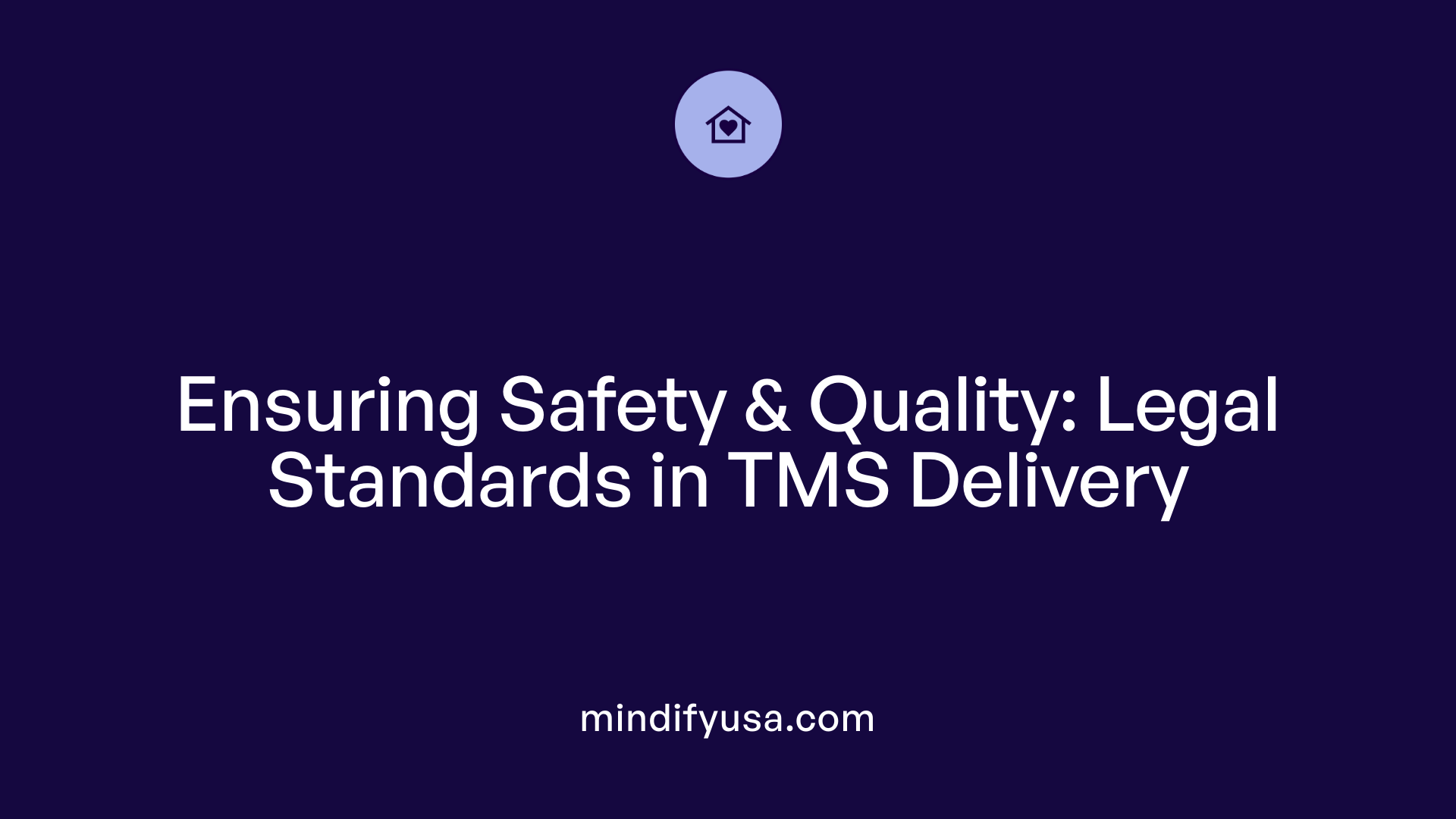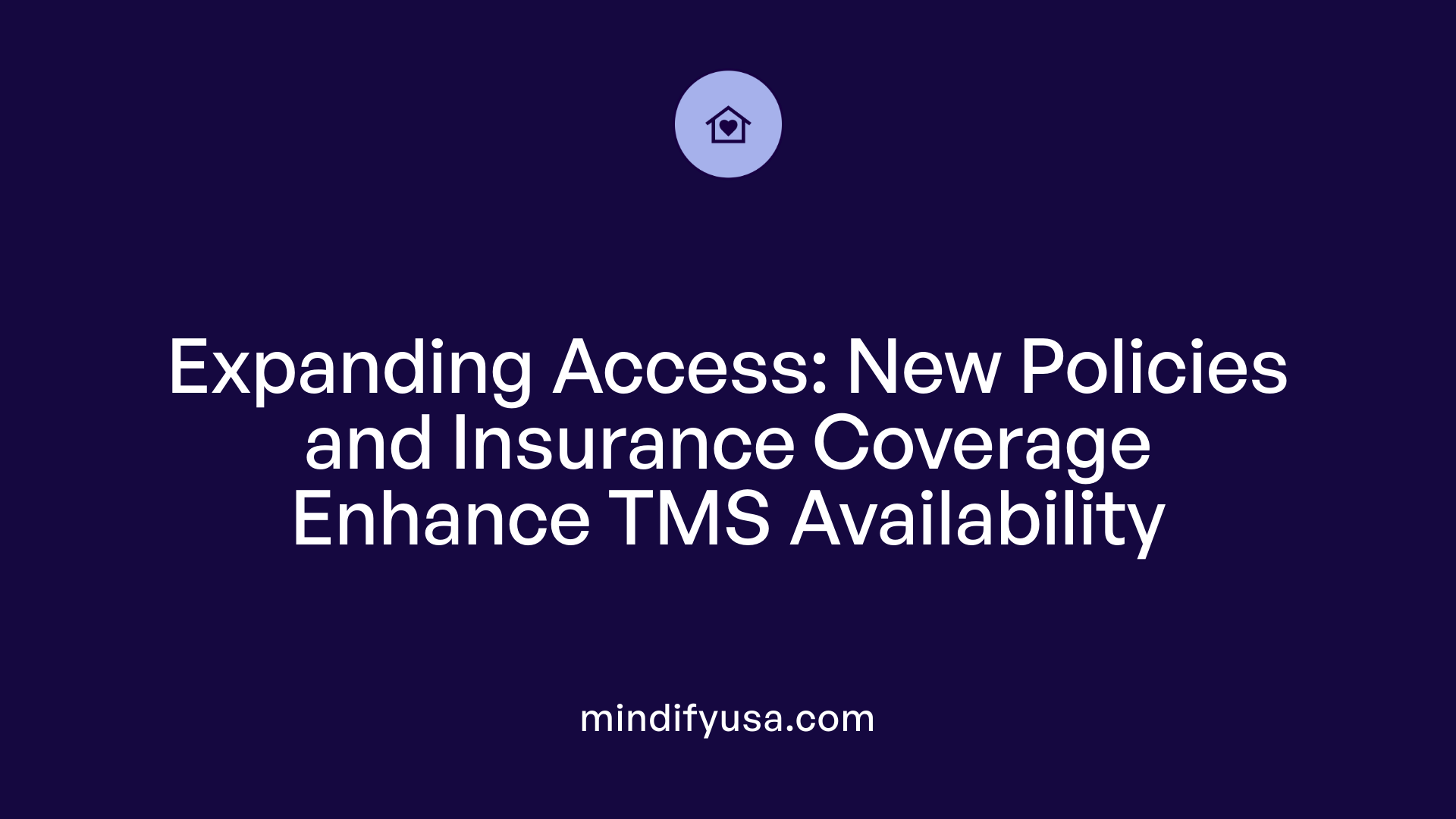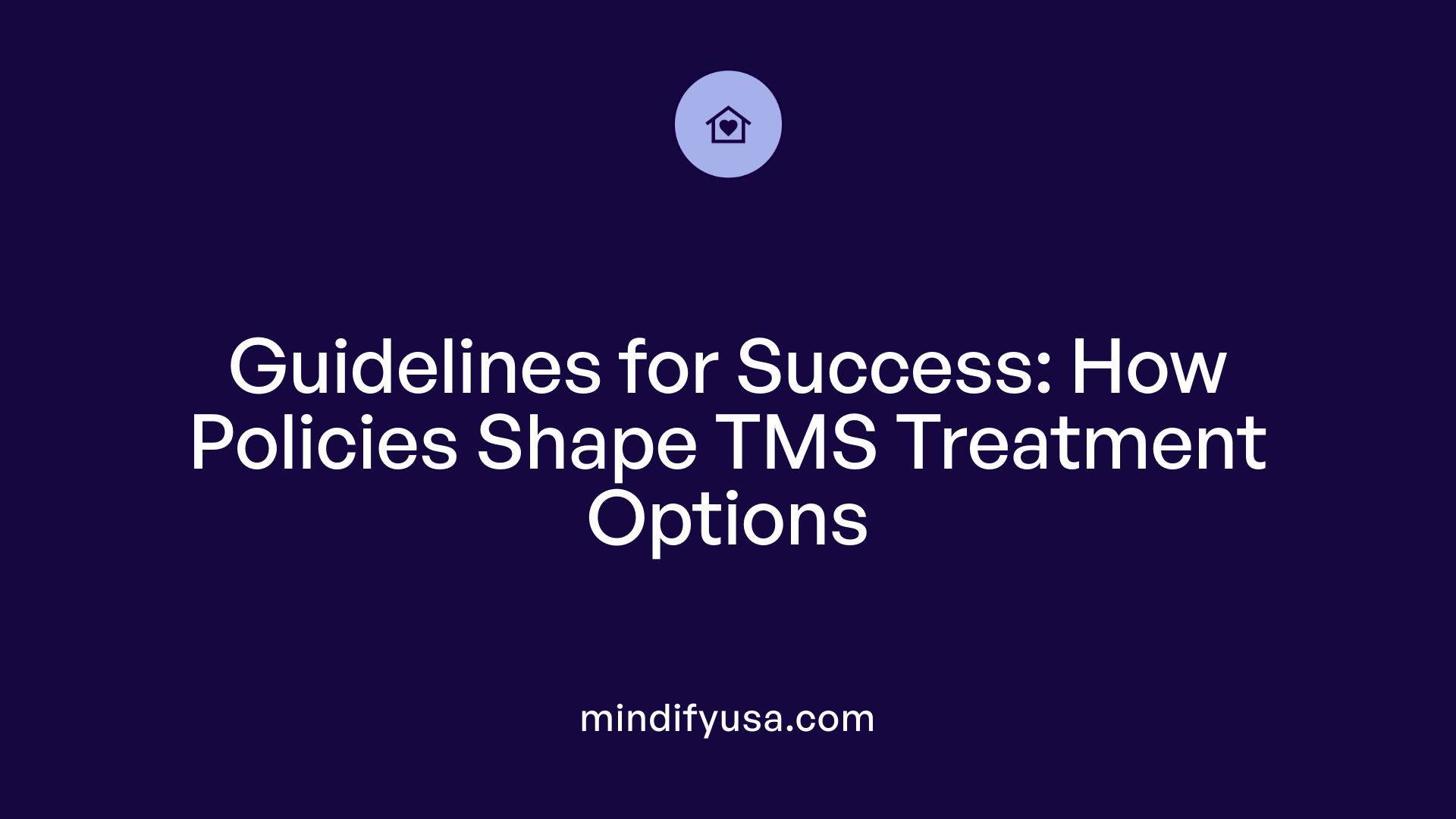Understanding How Regulations Shape Access to TMS Therapy in NJ
Transcranial Magnetic Stimulation (TMS) has emerged as a groundbreaking, non-invasive treatment for depression and other mental health conditions. In New Jersey, regulations, policies, and insurance frameworks play a pivotal role in determining how readily patients can access this innovative therapy. This article explores the multifaceted regulatory environment in NJ, examining how state-specific rules, federal guidelines, and insurance policies collectively influence TMS accessibility.
Regulatory Approvals and Safety Standards in TMS
 Transcranial Magnetic Stimulation (TMS) therapy in New Jersey benefits from stringent regulatory standards that ensure its safety and effectiveness. The U.S. Food and Drug Administration (FDA) plays a central role in the approval process for TMS devices. Before a TMS device can be marketed and used clinically, it undergoes rigorous evaluation to demonstrate its safety and efficacy for specific conditions, primarily treatment-resistant depression.
Transcranial Magnetic Stimulation (TMS) therapy in New Jersey benefits from stringent regulatory standards that ensure its safety and effectiveness. The U.S. Food and Drug Administration (FDA) plays a central role in the approval process for TMS devices. Before a TMS device can be marketed and used clinically, it undergoes rigorous evaluation to demonstrate its safety and efficacy for specific conditions, primarily treatment-resistant depression.
In New Jersey, TMS providers must adhere to federal regulations set by the FDA, which oversee the manufacturing, marketing, and clinical use of TMS equipment. These regulations ensure that devices meet strict quality control standards, minimizing potential risks during treatment.
Safety and efficacy standards are also reinforced through ongoing oversight by relevant authorities. The FDA's approval process includes clinical trials, post-market surveillance, and periodic updates to protocols based on new research data. These measures help maintain high standards for patient safety.
Regulatory bodies, such as the FDA, also oversee how TMS is implemented within clinical settings. They enforce guidelines related to practitioner training, treatment protocols, and patient selection. Proper adherence to these standards ensures that patients receive treatment in a safe environment.
Access to TMS therapy in New Jersey is influenced by these regulations. Because the FDA approves specific indications and protocols, insurance coverage often depends on compliance with approved procedures. As regulations evolve to support new uses of TMS, such as for additional mental health conditions, access is likely to expand further.
In summary, regulatory oversight by agencies like the FDA plays a vital role in making TMS a safe, reliable, and accessible treatment option in New Jersey. This oversight maintains high safety standards while enabling TMS to reach more patients in need.
Legal and Practice Standards in TMS Delivery

What legal and regulatory factors affect TMS treatment access?
Access to Transcranial Magnetic Stimulation (TMS) therapy in New Jersey is influenced by various legal and regulatory standards that ensure safety and efficacy. These factors include strict device approval processes overseen by federal agencies such as the FDA, which certifies that TMS equipment is safe for clinical use.
Practitioner certification and licensing requirements play a crucial role in maintaining high standards for therapy delivery. Clinicians must undergo specialized training and obtain appropriate licenses, and many must also engage in ongoing education to stay updated with current practices.
Legal standards also demand thorough documentation of patient treatment plans, progress, and consent forms. These measures protect both patients and providers and establish accountability.
Failure to comply with these regulations can have serious consequences. Non-compliance might lead to fines, legal actions, or the loss of licensing, which limits the availability and access to TMS therapy.
Regulations are also evolving to incorporate new safety data and identify contraindications, shaping who can administer TMS and under what conditions. This ongoing regulatory development aims to enhance patient safety and expand access responsibly.
Below is a summary of the crucial aspects impacting TMS treatment access:
| Aspect | Description | Impact on Access |
|---|---|---|
| Device Approval | FDA approval of therapy devices | Ensures only safe, tested devices are used |
| Practitioner Licensing & Certification | Specific training and licensing requirements for clinicians | Guarantees qualified practitioners administer treatment |
| Documentation & Informed Consent | Legal obligation to document and inform patients | Protects rights and ensures informed participation |
| Regulatory Enforcement | Penalties for non-compliance, ongoing regulation updates | Limits practice to compliant professionals |
Understanding these standards helps clarify how legal and regulatory factors influence the availability and quality of TMS in New Jersey.
State and Federal Policy Updates Affecting TMS Accessibility
 Recent policy changes in New Jersey and across the nation have significantly impacted the availability of Transcranial Magnetic Stimulation (TMS) therapy. TMS is an FDA-approved, non-invasive treatment primarily for depression, and increasingly for other mental health conditions. As policies evolve, so does patient access.
Recent policy changes in New Jersey and across the nation have significantly impacted the availability of Transcranial Magnetic Stimulation (TMS) therapy. TMS is an FDA-approved, non-invasive treatment primarily for depression, and increasingly for other mental health conditions. As policies evolve, so does patient access.
At the federal level, the Food and Drug Administration (FDA) has approved specific TMS protocols, ensuring safety and establishing standards for practitioners. These regulations guarantee that TMS devices are used safely, and trained clinicians can provide the treatment with confidence.
In New Jersey, recent updates have expanded insurance and Medicaid coverage for TMS. Most major insurance plans now cover the therapy, and Medicaid has broadened its coverage, making TMS accessible to more eligible patients. This policy shift reduces financial barriers and encourages clinicians to recommend this effective treatment.
Insurance policies often require patients to have tried other treatments without success, known as treatment resistance, before approving TMS. Such protocols ensure that the therapy is used appropriately and responsibly.
The impact of these policy updates is substantial. They not only increase the number of individuals who can access TMS but also standardize treatment procedures, making it easier for healthcare providers to incorporate TMS into their practice.
| Policy Aspect | Recent Changes | Effect on Access | Additional Notes |
|---|---|---|---|
| FDA Regulations | Approval for depression, OCD | Sets safety standards | Certifies device use and practitioner training |
| NJ Medicaid | Coverage expanded | More patients covered | Reduces out-of-pocket costs |
| Insurance Policies | Requiring prior treatment | Ensures appropriate use | Facilitates reimbursement |
These developments contribute to a broader, more equitable health landscape where more patients can benefit from advanced, non-invasive mental health treatments like TMS.
Insurance, Medicaid, and Reimbursement Policies in NJ

How do insurance and Medicaid policies play a role in TMS access?
Insurance providers and Medicaid are crucial in determining how easily patients in New Jersey can access Transcranial Magnetic Stimulation (TMS) therapy. These entities require that TMS treatments meet specific criteria to qualify for coverage.
In New Jersey, most private insurance plans, along with Medicaid, base their approval on FDA approval, ensuring the treatment's safety and effectiveness. Typically, patients must document failure of at least two different antidepressant medications before being eligible. This requirement aims to confirm that TMS is used as a treatment for resistant depression when other options have been exhausted.
Recent changes in policies have opened more doors for patients. Medicaid programs in New Jersey have expanded to cover TMS for both adults and adolescents, increasing availability for younger populations. This expansion has been a significant step toward addressing mental health needs across different age groups.
The reimbursement process often involves obtaining prior authorization, which requires detailed medical documentation and proof of previous failed treatments. Billing codes specific to TMS treatments facilitate the claim process, but delays in approval can still hinder patient access.
Overall, insurance and Medicaid policies directly influence how accessible TMS therapy is for residents of New Jersey. These policies help ensure that only appropriate candidates receive treatment while also managing healthcare costs, but they can sometimes pose barriers for those needing immediate assistance.
| Aspect | Description | Impact on Access |
|---|---|---|
| Coverage Criteria | Usually requires treatment resistance; documentation of failed medications | Limits who can qualify for TMS |
| Reimbursement Policies | Prior authorization and billing codes | Can delay or restrict treatment |
| Policy Changes | Medicaid expansion to cover more age groups | Increases treatment opportunities |
Understanding these policies helps patients and providers navigate the complex process involved in securing TMS therapy in New Jersey.
Medical Policies and Clinical Guidelines Shapes TMS Availability
 How do medical policies and clinical guidelines affect TMS treatment availability?
How do medical policies and clinical guidelines affect TMS treatment availability?
Medical policies and clinical guidelines play a crucial role in shaping the accessibility of Transcranial Magnetic Stimulation (TMS) therapy in New Jersey. These frameworks set the eligibility criteria, determine standardized treatment protocols, and influence reimbursement policies with insurance providers. When the FDA approves new uses of TMS, such as for adolescent depression, these approvals often lead to updates in clinical guidelines, allowing healthcare providers to adopt the therapy for a broader patient group.
In New Jersey, adherence to these evolving guidelines ensures that clinics and practitioners meet the necessary standards for providing TMS and securing insurance reimbursements. As clinical guidelines expand with emerging evidence and regulatory approvals, they help remove administrative barriers, enabling more patients to receive this non-invasive and effective treatment.
The impact of these policies extends beyond eligibility. They encourage the adoption of TMS as a mainstream treatment option, help establish consistency in care, and promote wider acceptance among healthcare providers. This alignment between regulatory approvals, clinical practice, and insurance policies ultimately increases TMS availability to those who need it, ensuring that treatment is both accessible and affordable.
Additional Resources:
| Aspect | Description | Impact |
|---|---|---|
| Eligibility Criteria | Defined by clinical guidelines and FDA approvals | Broadens patient access after new approvals |
| Reimbursement Policies | Based on insurance coverage rules | Ensures payment for treatments compliant with standards |
| Treatment Protocols | Standards for number of sessions and procedures | Maintains quality while adapting to new evidence |
| Provider Practices | Influenced by guidelines and policies | Encourages consistent, evidence-based care |
Ensuring Equitable Access Through Thoughtful Regulation
The regulatory environment in New Jersey plays an essential role in shaping the accessibility of TMS therapy. Federal agencies like the FDA set vital safety and efficacy standards that determine which protocols are available and reimbursable. State policies, including Medicaid expansion and insurance guidelines, further influence who can afford and receive TMS treatment. Practitioner certification and adherence to legal standards ensure safe and effective delivery of care. As policies continue to evolve, balancing safety with expanding access, the goal remains clear: to provide patients with effective, safe, and accessible TMS therapy that can significantly improve mental health outcomes across New Jersey.
References
- TMS Therapy in NJ: How and Where to Get Started
- Policy update for transcranial magnetic stimulation codes
- Regulatory Clearance and Approval of Therapeutic ...
- Safety and recommendations for TMS use in healthy subjects ...
- Mismatch of Evidence and Insurance Coverage Policies in ...
- Expanded Health Policies Enhance TMS Therapy Access for ...
- Legal & Regulatory Considerations For TMS Practitioners
- Safety, ethical considerations, and application guidelines ...
- Regulatory Clearance and Approval of Therapeutic ...
- Safety and recommendations for TMS use in healthy ...





































































































